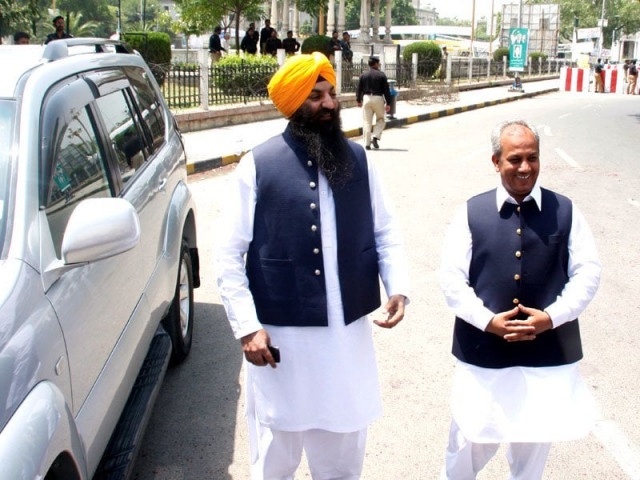Minority rights: No minor issues
This time round, Pakistan’s religious minorities are all set to make sure they get their rights through legislation.

Sardar Ramesh Singh Arora, the first Sikh member of the Provincial Assembly since 1947. PHOTO: ABID NAWAZ/EXPRESS
Members of minority communities have pledged to pile up pressure on the upcoming government to promote religious freedom from the very onset. As the last few years saw risks to minorities reaching alarming proportions, it seems the minorities mean business when it comes to making sure their interests are guarded.
Minorities’ representatives, both in the parliament and the provincial assemblies, want fresh legislation on religious freedom to protect the rights of an estimated nine million non-Muslims living in Pakistan.

“We want to get the necessary bills passed from the Parliament soon,” said MNA Aasiya Nasir who is a Christian MNA from the platform of Jamiat Ulema-e-Islam-F. Minorities want to stay away from the sensitive issues but will continue to struggle for their basic rights, she added.
An important proposed bill seeking increase in minorities’ quota in assemblies has already been passed by the previous federal cabinet. An important proposed bill seeking registration of Hindus, the largest minority in Pakistan, is pending with the standing committee concerned since 2011.

The Council for Islamic Ideology (CII) should also pass its recommendations pertaining to the laws which may assure a better and safer life for vulnerable minorities, he added.
At present, some 38 non-Muslims are representing minorities in the Parliament as well as in the provincial assemblies. Ten members are elected on NA reserved seats in the lower house of the Parliament and four are already representing the minorities in the Senate.

Nine members are representing minorities in Sind Assembly, eight in Punjab Assembly and three each in Balochistan and Khyber-Pakhtunkhwa Assemblies. Only one MPA, Dr Mahesh Malani, won direct elections from PS-61, Tharparkar, Sindh. “Legislation on three major issues – forced marriages, forced conversion of religion and registration of Hindus marriages must be done in first Parliamentary year,” said Malani.
Last year, minorities’ representatives succeeded in getting a bill passed from the federal cabinet which principally approved an increase in seats reserved for non-Muslims in the legislatures in proportion to their population. The proposed bill, however, could not be tabled to the parliament due to some unknown reasons.
“We will table this bill to the National Assembly this year,” said MNA Dr Ramesh Kumar who admitted differences among minorities. “While it is true minorities are divided in Pakistan, we want protection of mosques, churches, gurdwaras and temples,” he added.
MPA Ramesh Singh Arora, addressing the specific issues of Sikh community, said there is a sense of insecurity among Sikhs in Khyber-Pakhtunkhwa (KP) due to the law and order situation. “Protection of Sikhs’ places of worship must be given priority under the new legislation,” Arora told The Express Tribune.
Some 100 plus gurdwaras until now have been closed due to negligence of the ‘Auqaf’ Department in Punjab and KP, Arora, who is the first MPA in Punjab since separation of Pakistan, said. “I’ll urge the government to operationalise these worship places again.”
MPA Arif Masi, talking about issues related to the Christian community, the second largest minority in Pakistan, said he also recalled several blasphemy cases registered against Christian community. “Representatives of minorities irrespective of their beliefs should stand united to address the issues they are facing,” he concluded.
Published in The Express Tribune, June 5th, 2013.



















COMMENTS
Comments are moderated and generally will be posted if they are on-topic and not abusive.
For more information, please see our Comments FAQ